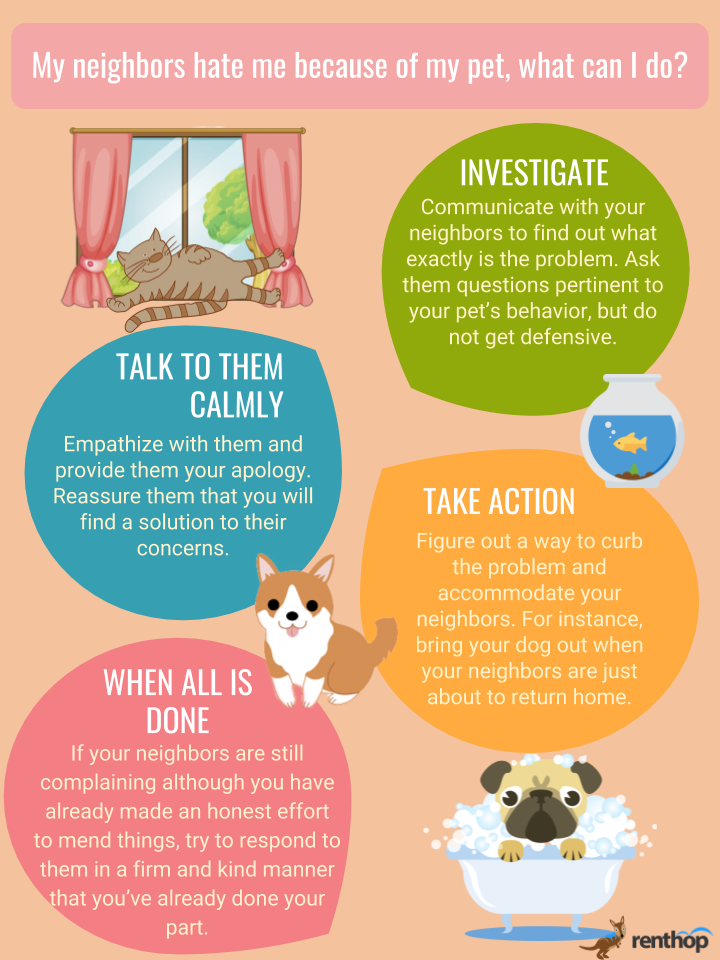So you have a lovely dog in your apartment, but your neighbors frequently complain about the barking. Or, your neighbors don’t like the fact that your pet cat always ventures into their yard. Many renters enjoy having pets in their apartments, but your neighbors may have harsh feelings because of your pet. There are some steps you can take to ease the tension and restore the relationship.
Investigate
It is crucial to communicate with your neighbors and find out what the exact problem is. Ask questions pertaining to the issue, but do not make your neighbors defensive. Was it the barking of your dog, your cat who tends to always wander into their houses or the fact that they are allergic to your pet? How often does it happen? At night while you were sleeping or in the day when you are not at home? Finding the issue that’s causing your neighbors’ annoyance will help you nip it in the bud and refrain your pet’s behavior from affecting your neighbors again. Some common reasons that could cause neighbors not to like pets:

- Loud noises are the most common reason why neighbors dislike pets, such as barking, howling or crying. Some dogs are known to howl or cry when their owners leave them alone, likely due to separation anxiety.
- Larger animals make more noise when they run around the apartment, which is the reason why pet-friendly rentals impose weight limits on pets. The heavier the pet, the more damage it can do to the floors. Another source of loud noises made by pets is when a big dog scratches the surface of the floors when running.
- If you live in an area with private outdoor spaces, your outdoor friend way wander onto a neighbor’s property.
- Domestic birds may create noises like pleasant chirps or piercing squawks, which may annoy your neighbors.
- Unique pets like reptiles or exotic creatures may alarm your neighbors if they’re uncomfortable with the animal.
Speak Calmly
Resolve the issue with your neighbors by listening and understanding why they are unhappy with your pet’s behavior. Empathize with them and then provide reassurance that you do wish to find a solution to their concerns. Most importantly, take the high ground, offer them your sincere apology and tell them to bear with you as you try to solve the situation.
If you’re dealing with complaints from downstairs neighbors, consider adding carpets and rugs to the floors. This muffles the sound of scratching down below.
Take Action
Once you have identified the problem, the next step is to figure out how to reasonably accommodate your neighbors. Follow local laws by picking up after your dog when they use the bathroom. If it works for your schedule, take the dog out for a walk when your neighbors are just about to return home to minimize the barking. Alternatively, you could get your roommate or a dog walker to take your dog out for a walk when you happen to be unavailable.
When All is Done
By taking action, you should have ensured that your neighbors are no longer affected by your pet’s behaviors. However, if you have already made an honest effort to mend things, but your neighbors are still complaining unreasonably, you may have to disengage. Be careful not to get defensive and fire back at them as it fuels their hatred towards your pet or even sparks a conflict. Respond to them in a firm and kind manner that you have already done your part to settle the problem.
Always remember to keep your neighbors informed of your efforts to address their concerns and seek feedback from your neighbors to determine if there are any improvements. However, if you see your neighbor deliberately antagonizing your pet, you might wish to document that with a video camera and keep your pet safe. Above all, be polite and considerate to your neighbors, and also be a responsible pet owner.
Editor’s Note: We updated this article to enhance readability.




